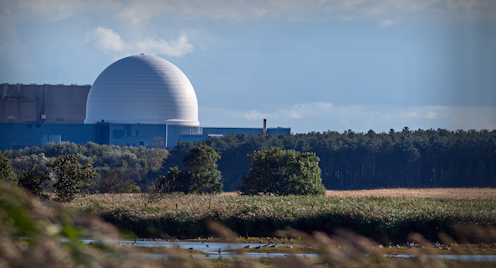Nuclear power has an advantage not reflected in the average price. It’s price stability, and for some users that matters
- Written by Magnus Söderberg, Professor & Director, Centre for Applied Energy Economics and Policy Research, Griffith University

Much of the debate about nuclear power in the month since the Coalition announced its plan to install reactors in seven states[1] has been about cost.
But some things matter more to electricity users than the average price they pay for electricity.
For big industrial users who either buy their power wholesale, or renegotiate their fixed-term price contracts frequently, it is important that the wholesale price is fairly steady.
Nuclear power plants produce power at a fairly steady pace, which leads to a more steady market price. Power systems built around wind and solar produce cheaper power, but with more uncertain output and much greater variability in price[2].
This greater variability can be smoothed to some extent by adding storage such as pumped hydro and large-scale batteries, but to the extent that it remains, uncertain prices make investments in power-hungry projects harder to justify.
The greater the uncertainty, the more investment moves to other firms, other less energy-intensive industries and other countries.
This has been confirmed in a study of the behaviour of thousands of Chinese firms[3] between 2008 and 2018.
Variable prices cut the value of firms
I presented preliminary results from a project using data from Queensland during Australian Energy Week last month.
Those results suggest that higher volatility in wholesale electricity prices lowers the share price of listed firms in the metals and mining industries.
Intraday price volatility has doubled over the past five to ten years. I find this has cost the firms that suffered it 5% of their share market value.
The metals and mining industries are valued at about A$40 billion, meaning a 5% reduction corresponds to $74 per Australian, each year.
Without nuclear, prices vary more
Now back to nuclear. Since nuclear power can generate electricity regardless of the weather, an advantage it has is lower price volatility.
We can see this by investigating what has happened in other countries when a sizeable proportion of the nuclear capacity has been taken offline.
Two recent examples from Europe illustrate this.
The first is from Germany which shut down three nuclear reactors on December 31, 2021, halving Germany’s nuclear power capacity overnight.
The second example is taken from France. There, stress corrosion cracking was discovered in several reactors and in April 2022, it had taken out 28 of France’s 56 reactors.
In Germany, shutting down the reactors pushed up price volatility by 5% to 15%. France experienced a few extreme price spikes, which also drove up the volatility.
In nearby southern Sweden and Poland, price volatility fell 10% to 25% during the same period.
As we keep expanding wind and solar, it is highly likely that electricity wholesale price volatility will climb further.
If Australia continues to rule out nuclear power, it is necessary to ask what else it can do to keep price volatility in check.
References
- ^ reactors in seven states (www.peterdutton.com.au)
- ^ variability in price (www.tandfonline.com)
- ^ thousands of Chinese firms (www.sciencedirect.com)
- ^ Shutterstock (www.shutterstock.com)
Authors: Magnus Söderberg, Professor & Director, Centre for Applied Energy Economics and Policy Research, Griffith University














